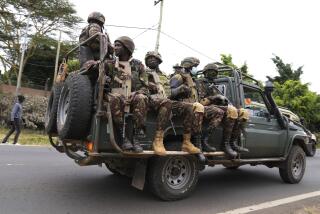Palestinian Government Workers Attack Parliament Over Paychecks
RAMALLAH, West Bank — In the latest spasm of chaos, angry Palestinian government employees who haven’t been paid in months stormed the parliament building here Wednesday, and skirmishes between rival factions in the Gaza Strip left at least one person dead.
Near-daily violence is occurring as part of a volatile power struggle that has been percolating in the West Bank and Gaza Strip since late January, when the militant Hamas movement unseated the Fatah party in legislative elections. It has plunged Palestinian society into financial and political disaster and raised the specter of all-out civil conflict.
There was one bit of temporary relief: The Palestinian foreign minister returned Wednesday from a tour of Muslim nations with a reported $20 million stuffed in his suitcases.
The Hamas-led government has been desperate for cash since Western nations that sustained the Palestinian Authority for years froze most funding because of the group’s endorsement of violence and refusal to recognize Israel.
Chanting “We are hungry,” scores of protesters burst into parliament Wednesday morning as lawmakers gathered for a session. The pro-Fatah protesters hurled water bottles at Hamas legislators, climbed atop desks, upended files and drove the speaker of parliament, Aziz Dweik, of Hamas, to flee under guard.
It was the second attack in as many days at parliament, which has become a symbol of contested political power. On Monday, Fatah gunmen shot up and burned the building and briefly abducted a Hamas legislator. The building’s windows were still cracked and pockmarked Wednesday.
After Wednesday’s incidents, Hamas responded with a counterdemonstration. Hundreds of men and women, many waving or draped in the Islamist group’s green flag, surged through Ramallah streets and rallied outside parliament and the offices of Palestinian Authority Prime Minister Ismail Haniyeh, also of Hamas. Shopkeepers in the central business district closed their stores, either in support of the demonstrators or out of fear of more violence.
“There are parties who are trying to stir up trouble and create divisions among the Palestinians,” Hamas official Farhat Assad said to the Hamas demonstrators. Addressing Fatah supporters, he added: “We ask, whose interests are you serving through these actions, burning down our institutions? It is uglier than the practices of the Israeli occupation.”
Separately, a gang of youths from the Amari refugee camp went on a vandalism rampage after a companion was shot to death by Palestinian police as he allegedly tried to steal a car. The group smashed traffic lights and attacked businesses, including a popular restaurant called Stones that had become a favorite among yuppie Palestinians. The violence, though not political, contributed to the sense of lawlessness.
The real power struggle is over who controls the streets and the guns. Sporadic fighting between Fatah and Hamas security cadres in recent weeks has left more than a dozen people dead.
On Wednesday, in the town of Khan Yunis in Gaza, Hamas militants ambushed and wounded the local commander of Fatah-dominated security services loyal to Mahmoud Abbas, the Palestinian Authority president. Supporters of the commander, Rifat Kulab, had shot and killed a Hamas gunman. That man’s supporters in turn torched Kulab’s home.
At virtually the same time, Abbas and Haniyeh were meeting in Gaza City with their top security officials in an attempt to halt the increasingly deadly fighting.
Later Wednesday, officials said they had agreed to a plan to integrate a 3,000-man militia formed by the Hamas-led Interior Ministry into the Fatah-dominated national police. That way, said Mohammed Dahlan, a top security official and Fatah member who announced the agreement, only uniformed agents belonging to a single institution would be on the streets.
“It is clear there is a chaos,” he said.
But Dahlan offered few details on how the integration would work, nor did he present a timetable. It appeared that key elements had yet to decided. Previous agreements to end the conflict between the competing security services failed, and the latest plan was greeted with general skepticism.
Meanwhile, Foreign Minister Mahmoud Zahar was apparently doing his bit for the Palestinians’ cash flow problems. The Hamas official returned to Gaza from a tour of Muslim countries, including Indonesia, Malaysia and Iran, with $20 million in euros in his luggage, according to several Palestinian officials.
Zahar did not attempt to conceal the money at the Rafah border crossing, where he entered Gaza from Egypt, and it was to be turned over to the government treasury, said a Cabinet official accompanying him.
Transporting large amounts of cash has become a somewhat common way to infuse government coffers since the international boycott against Hamas has made banks unwilling to get involved with money transfers to an organization the United States considers a terrorist group.
*
Special correspondents Maher Abukhater in Ramallah and Fayed abu Shammaleh in Gaza City contributed to this report.
More to Read
Sign up for Essential California
The most important California stories and recommendations in your inbox every morning.
You may occasionally receive promotional content from the Los Angeles Times.











